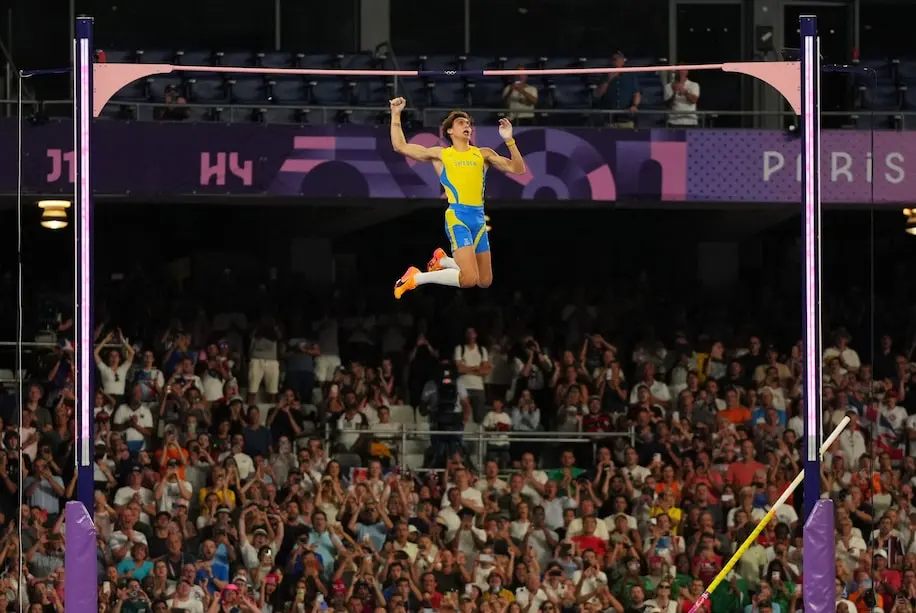SAINT-DENIS, France — The only man standing on the track was the one everybody had come to see. Victory had belonged to Armand “Mondo” Duplantis in every functional sense since he had remembered to lug his poles into Stade de France. He operates on a different plane than any other pole vaulter the sport has ever seen. He trains for the moments when the competition is over, when every eye is on him and his only rival is himself.
Duplantis had broken the world record eight times before Monday night. One last jump would determine whether Duplantis could reduce the barrier between man and flight again, by one more centimeter.
Duplantis failed on his first two tries to break his world record. Before his third, he spoke with his father and coach, Greg, and decided on a crucial adjustment. He sprinted down the runway, soared into the night and became one of the forever athletes of the Paris Olympics.
A Louisiana-born pole-vaulting genius who matriculated at LSU and competes under the flag of his mother’s native Sweden, Duplantis cleared 6.25 meters (20 feet 6 inches) on his final attempt. The Stade de France stadium lights flickered. The best crowd he had ever seen outside of Tiger Stadium produced a delirious wall of sound. He sprinted off the mat to the corner of the stadium, where he hugged his girlfriend and slapped high-fives with his brothers.
Duplantis pushes limits as much as any athlete at these Games. For one night, he would be content with a new barrier. Duplantis mingled afterward on the track with Carl Gustaf Folke Hubertus, the king of Sweden. (“Fam vad cool,” Duplantis said in Swedish — very cool.) He planned to party with family, and his brothers would drag him to karaoke, voice hoarse from interviews and all.
“I’ll probably have some liquid courage and get up onstage,” Duplantis said.
He had proved himself the ultimate performer well before Monday. Duplantis first broke the world record in February 2020, nudging it up one centimeter to 6.17 meters. He has since made it his lucrative plaything. Duplantis had broken it seven more times since, always by a centimeter, which maximizes the number of times he can trigger sponsorship bonuses for world records.
Duplantis’s record at the start of the night stood at 6.24 meters (20 feet 5¾ inches). Only three other men in the field had surpassed a six-meter bar, and American Sam Kendricks had not done so in five years.
The competitive portion of the night was about the silver medal. Kendricks won it with a 5.95-meter clearance three years after an experience that embittered him. He tested positive for the coronavirus and could not compete at the Tokyo Olympics. Kendricks, the Rio de Janeiro bronze medalist, was mad that a follow-up test he believed cleared him was not used. He was incensed at how he was put in isolation and, in his mind, discarded.
“I don’t want to be bitter,” Kendricks said. “I want to love all the people that are involved in it. I know back in the day, there’s a lot of people that love me that were put between a rock and a hard place. They weren’t able to be next to me. And it hurts me that I have to be mad at somebody.”
Kendricks takes pride in his two victories over Duplantis, including at the 2019 world championships. He understood that eventually the prodigy finding his way would surpass him. “I’m a very small boogeyman in Mondo’s life,” Kendricks said.
The night at Stade de France slowly arced toward Duplantis. The mayhem of the women’s 5,000 meters passed. American Valarie Allman claimed her second consecutive discus gold medal. Duplantis’s vanquished competitors celebrated their silver and bronze. Only he remained.
First, he set the bar at 6.10 meters, shattering the 6.03-meter Olympic record. Then he asked for the bar to put at 6.25 meters, higher than it had ever been set before.
On his first attempt, he banged his right elbow on top of the bar. On his second, he achieved the requisite height but shortly after he began his fall to Earth, his chest hit the bar. He walked to the first row of the stands and spoke with his father.
Pole vaulters are allowed to move the standards — the uprights that hold the bar in place — closer or further from their takeoff point. Duplantis had taken his first two cracks at the record with the standards 70 centimeters away from the plant box.
Duplantis had jumped high enough on his second try, but he had not soared far enough. So Greg devised a solution. Duplantis would move the standards from 70 to 60 centimeters — 10 centimeters closer to his takeoff.
When Duplantis walked to the official, an instinct overcame him. At many events, the standards only move in increments of five. With Olympic-level equipment, officials could be as precise as they wanted. Duplantis asked not for the 60 that Greg prescribed but 62.
“It would be dope and a nice jab at my father if 62 was the perfect number,” Duplantis said.
Once the standards had been reset, Duplantis carried his pole to the back of the runway and leaned it on his shoulder. When Duplantis was a child, Greg, who was a pole vaulter at LSU, built a runway in his backyard out of an abandoned track he bought for pennies on the dollar. Each time his youngest son ran down it, he imagined a bar set beyond the world record at the Olympic final.

“I felt like I had already been in this moment 1,000 times,” Duplantis said.
Now, Duplantis raised his arms over his head and clapped once. The crowd responded with thunder. Another clap, then another. Faster: Clap. Clap. Clap clap. Clap clap clap clapclapclapclapclapclapclapclapclap.
Duplantis bolted. His extraordinary ability begins with his speed. Many pole vaulters take up the sport once they realize they will never possess the world-class speed of a sprinter. Duplantis might have it.
“He runs with God’s hand on his back,” Kendricks said.
“You feel the takeoff spot,” Duplantis said. “Right when I hit it at the takeoff, I kind of knew.”
Duplantis inverted, rose two stories off the ground, twisted his body and folded himself like a trapdoor. The bar remained still. He floated to the mat and landed with a roar. He hugged his family, and then he walked back to the coaches box and embraced Greg.
Duplantis had surpassed another limit. Every new mark invites the question of how far he can fly. He lives his life to expand the possible. For one night, Duplantis would embrace what he had done instead of what he could do next.
“I don’t even really care right now,” Duplantis said. “Why would I care about anything else other than what just happened?”






